九年级英语_Unit_10_By_the_time_I_got_outside__the_bus_had_already_left全单元课件_人教新目标版
九年级英语全册 Unit10 By the time I got outside, the bus
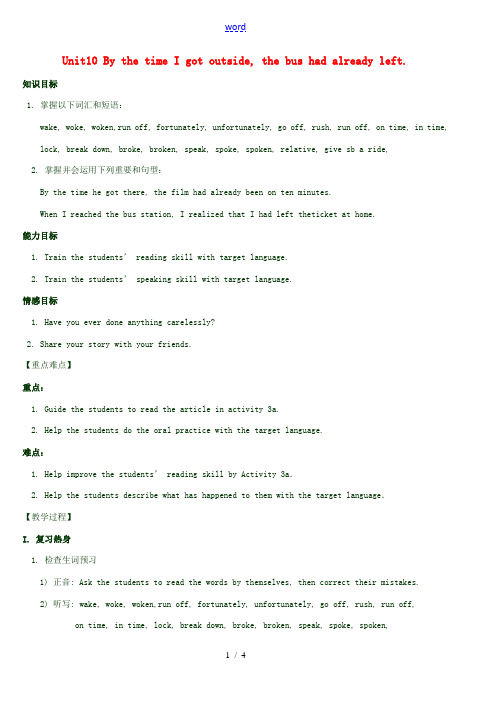
Unit10 By the time I got outside, the bus had already left.知识目标1. 掌握以下词汇和短语:wake, woke, woken,run off, fortunately, unfortunately, go off, rush, run off, on time, in time, lock, break down, broke, broken, speak, spoke, spoken, relative, give sb a ride,2. 掌握并会运用下列重要和句型:By the time he got there, the film had already been on ten minutes.When I reached the bus station, I realized that I had left theticket at home.能力目标1. Train the students’ reading skill with target language.2. Train the students’ speaking skill with target language.情感目标1. Have you ever done anything carelessly?2. Share your story with your friends.【重点难点】重点:1. Guide the students to read the article in activity 3a.2. Help the students do the oral practice with the target language.难点:1. Help improve the students’ reading skill by Activity 3a.2. Help the students describe what has happened to them with the target language.【教学过程】I. 复习热身1. 检查生词预习1) 正音: Ask the students to read the words by themselves, then correct their mistakes.2) 听写: wake, woke, woken,run off, fortunately, unfortunately, go off, rush, run off,on time, in time, lock, break down, broke, broken, speak, spoke, spoken,relative, give sb a ride,2. 自由交谈1) Revise what happened to Tina by asking several students to tell the story.2) Revise the three forms of the verbs in Grammar Focus by asking four students to write them outon the blackboard.3) Check homework by asking one or two to read their own endings of the stroy.4) Check homework by asking some students to read the sentences which they made.Ⅱ. 阅读训练 3aRead the story and write the events in the correct order. Ask the students to read the instructions together.1. Fast reading:Ask the students to read the article quickly and find the main idea of the passage.The article is a story about a student. It is his daily life. Read it after the tape, underlining all the expressions and circling the uses of past perfect.2. Careful reading:1) Tell the students to read the article carefully and silently.2) Ask the studentsto plete the work by themselves. Then discuss their answers in pairs. In a minute,ask some students to report their answers to the class.3)Write the answers on the blackboard as they report, putting the events in the correct order. Answers:1. alam clock didn’t go off2.father went into bathroom3.woke up late4. took shower5.had some breakfast6.bus left7.ran to bus stop 8.started walking9.got a ride with a friend10.bell ringing11. got to school 12. got to class3. Oral reading:First, the teacher play the tape. Then ask the students to follow the tape. At last let themread the article by themselves. Check up some students.4. Intensive reading:Askthe students to read it carefully again. Explain the important points.1)我上学从来不迟到,但昨天我差点迟到了.I’ve never been late for school, but yesterday I came very close. close 在本句中做副词,意为“接近地;紧密地”如:She came close to him. I live close to the shops.另外: close 还可以做形容词意为“亲近的;密切的”.如:他是我亲密的朋友. He is my close friend.英语同法语很接近. English has a close affinity to French.2)公共汽车坏了。
【志鸿优化设计】秋九年级英语全册 Unit 10 By the time I got outsi

Unit 10 By the time I got outside, the bus had already left.Section A (3a3c)教学目标1.提高听、说、读、写能力2.能比较流利地讲述自己曾经过的特别的一天3.掌握过去完成时的用法教学重点1.学习一些生词及短语。
2.正确运用现在完成时和过去完成时。
3.能运用语言和语法知识进行阅读并理解文章意思。
教学难点正确运用现在完成时和过去完成时。
教学过程Step 1 Warmup根据1a, 2a中的图画,练习用by the time造句,巩固过去完成时的用法。
说明:通过多媒体课件展示出的丰富多彩的图画,刺激学生的视觉感官,避免了枯燥乏味的说教,激发了学生的学习积极性,让学生在轻松好奇的氛围中复习了上节课的目标语言。
Step 2 Section A3a1.引入话题所利用的语言:Some students are often late for school.Now we will read a student's story.Can you guess why the student was nearly late for school?(根据情景的提示,让学生自由发挥)Students:She got up late.She was illHer bike was broken....2.让学生阅读短文,核对自己的猜测是否正确,并找出正确答案。
当学生阅读时,老师列出以下词组:be late for, got off, come out, run off to, start doing, on time, give sb.a ride 让学生说出这些词组的汉语意思,并用它们造句。
说明:这些词组都是以前学过的而且经常使用,列出来给学生加深印象,以便他们能更灵活地将它们运用到各种场合。
3.让学生再次阅读短文,按顺序把所发生的事情列出来。
浙江省慈溪市金山初级中学九年级英语《Unit 10 By the time I got outsid
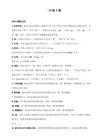
Tina had a terrible morning. What happened to her?
wait for him to go out
By the time she got up, her brother had already gotten in the shower. get ---got ---gotten
By the time I got outside, the bus had already left.
Period 1
The whole day’s work depends on the plan in the morning. 一日之计在于晨
What do you usually do in the morning?
1. By the time I got up, my brother
_h_a_d_ already _g_o_t_t_e_n in the shower.
2. By the time I got outside, the bus _h_a_d_ already _le_f_t.
3. When I got to school, I realized I _h_a_d l_e_ft_ my backpack at home.
• “I’m sorry to hear that, but may I know what happened?” said the teacher.
• Then Tina told the teacher and the whole class her story. All her classmates laughed loudly after it. Some of them said, "Poor Tina!"
[推荐学习]九年级英语全册 Unit 10 By the time I got outside,th
![[推荐学习]九年级英语全册 Unit 10 By the time I got outside,th](https://img.taocdn.com/s3/m/c419246ea8956bec0875e308.png)
Unit 10 By the time I got outside,the bus had already left理解背诵下列短语1.by the time到..时候2.go off 闹响3.run off/run away跑掉离开4.on time准时5.break down损坏6.show up出席露面7.April Fool's Day愚人节8.set off激起引起 9.get married结婚10. by the time到...时候11. a piece of一片一块12.The alarm clock went off just now. 刚才闹钟响了13.rush at sb朝某人冲奔 rush out of冲出...地方14.on time准时 in time及时15.The door is locked. 门被锁上了16.feel/be/get exhausted=feel stressed out 筋疲力尽17.announce sth / that从句宣布某事18.have a sad ending 有个悲伤的结局19.flee-fled-fled逃离 flee from + 地点从某地逃离 flee away逃离/逃跑20.set off激起 set off=set out 出发/起程21.reveal a hoax揭露一个谎言22.marry sb=get/be married to sb和某人结婚23.ask sb to marry sb求婚24.in one's forties在某人的四十多岁25.have a happy ending 有个美好的结局26.feel embarrassed感觉尴尬 an embarrassing thing一件尴尬的事27.fall asleep睡着28.look stressed out看上去筋疲力尽29.get in the shower =go into the bathroom 洗澡 get out of the shower洗完澡 take a quick show洗一个快澡30.get dressed穿衣31.run all the way to school 一路跑向学校32.run back to school 跑回学校33.get outside出去34.get to school 到达学校34.leave one's sth at +地点把某人的某物落在某地35.make it (to sth) 来的及某事36.be late for school上学迟到e very close来的非常紧凑 be close to sb与某人亲密38.wait for sb等待某人e out出版/出来40.run off to迅速离41.start doing sth 开始做某事42.in one's car=by car乘车43.give sb a ride 顺便载某人一程44.the final bell 最后的铃声45.invite sb to do sth 邀请某人做某事46.stay up late 熬夜到很迟47.April Fool 傻瓜48.fool sb愚弄某人49.happen to sb发生在某人身上50.change the clock to an hour earlier 调整闹钟提前一个小时51.stay up all night studying熬夜学习52.a radio program一个广播节目nd on the earth在地球着陆54.move across穿过55.so convinced that...如此确信以致...56.hundreds of成百上千 thousands of成千上百57. run to the local supermarket58.stop doing sth停止做某事59. no more 不再60.invit sb onto one's show 邀请sb上sb的节目61.be thrilled非常兴奋62.lose both A and B 失去A和B一.用动词的适当形式填空(每题1分,共20分)1. We _____________ (paint) the house before we ______________ (move) in.2. That rich old man _____________ (make) a will before he _____________ (die).3. Paul __________ (go) out with Jane after he __________ (make) a phone call.4.The Reads __ ______ (have) lunch when I ________________(get) to their house.5.When I ______________(arrive) at the station, he ____________________(leave).6.We _______________(learn) about 4000 English words by the end of last term.7. I waited until he _______________(finish) his homework.8. We were surprised at what she ________already ______(do)9.She _________(not go) to Qingdao because she ____________ (go) there before.10. He ______________(not tell) you the news yet.11. He said he _____________already_________(give) the book to the teacher.12. She told me she _________________(be) to Beijing three times.13.It ta kes me half an hour __________ (walk) to work every day.14.If it __________ (be) fine, we’ll go fishing tomorrow.15.He ___________ (live) in Beijing since he was eight years old.二.感叹句专练(填入what, what a, what an或how)1.______ important information it is!2.______ cold weather it is at the South Pole!3.______ great day July 1,1997 was!4 very careful worker Mike is!5.______ honest Angela is!6.______ useful work they did!7.______ nice flowers! Where did you pick them?8.______ beautiful Nanjing Road Walkway looks at nig ht!9.______ lovely weather it is today!10.______ exciting news he has told me!三、单项选择()1.-Did you see Jim at the party?-No, he_____________by the time I got there.A.had been awayB.has lef tC.had leftD.was leaving( )2.No one___________ to yesterday’s party except lucy.A.was invitedB.ha s invitedC.has been invitedD.had been invited( )3.Hellen____________for two weeks.A.was awayB.has left for the USAC.has gone to the U SAD.has been away( )4.My aunt_________until she was forty.A. got marriedB.didn’t maryC. wo uld marry.D.wasn’t marrying( )5.I’m waiting for Jim______ping-pong with me.to play B.plays C.is pla ying D.played( ) 6.They had learnt two thousand English words________last week.A.in the end ofB. by the end ofC.in the endD. at the end of( )7.Some students in Class One are playing football.What about__________.others B.another C.the other D.the others( )8.Ihad known about it before I_____ about it.A.had toldB.has been toldC.was toldD.would be told( )9.My alarm clock was broken. It didn’t_______This morning.e outB.go offC.take offD.set off( )10.Not only I but also Lucy________been to Beijing before.A.haveB.hasC.isD.had( )11.The dress_________by my uncle looks very nice.A.was boughtB.boughtC.had boughtD.has bought( )12.My aunt and uncle___________for two years.A.have got marriedB.have marriedC.have been marriedD.got married。
安徽省毫州市风华中学九年级英语《Unit 10 By the time I got outsid
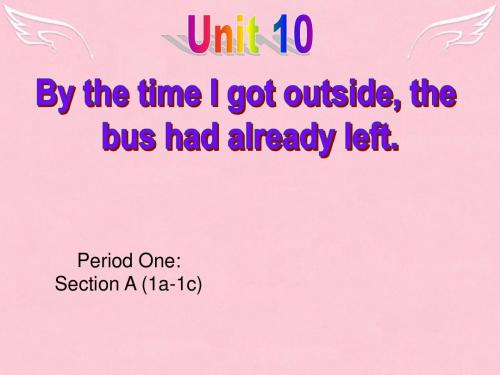
What do you usually do in the morning before school?
have a quick breakfast do morning exercises
What do you usually do in the morning before school?
walk to school
go to school by bike
Why or why not?
The whole day’s work depends on the 一日之计在于晨。 plan in the morning.
What happened to Tina this morning?
1b Listen to Tina talking about her morning. Complete the sentences.
rush v. 冲、奔
When Tina got to school, she realized she had left her backpack at home.
leave sth.+表地点的介词短语
2a Listen and number. 3
1
4 2
What happened to Tina this morning?
What happened to Tina this morning?
oversleep
v. 睡过头,睡得过_______________________. she overslept and got up late.
by the time 到……时候
(Ⅱ) Please make your own sentences.
By the time I got home,_____________. By the time I came in,______________. By the time I got to school,__________. By the time the bell rang,___________. By the time I got up,_______________.
山东省临沂市凤凰岭中学九年级英语全册《Unit 10 By the time I got outsi
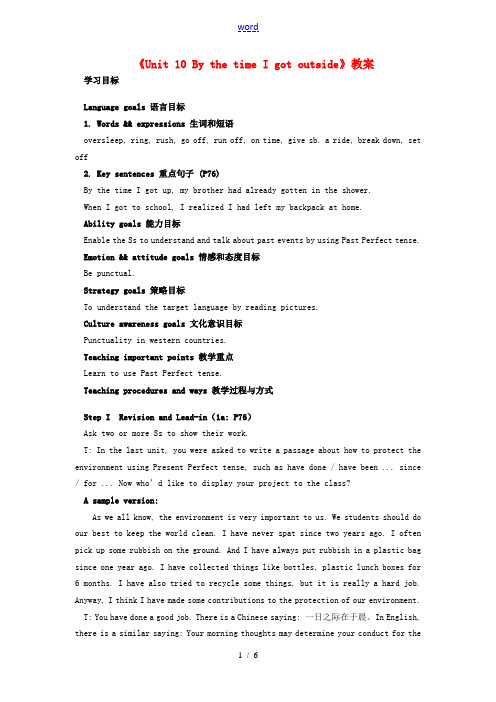
《Unit 10 By the time I got outside》教案学习目标Language goals 语言目标1. Words && expressions 生词和短语oversleep, ring, rush, go off, run off, on time, give sb. a ride, break down, set off2. Key sentences 重点句子 (P76)By the time I got up, my brother had already gotten in the shower.When I got to school, I realized I had left my backpack at home.Ability goals 能力目标Enable the Ss to understand and talk about past events by using Past Perfect tense. Emotion && attitude goals 情感和态度目标Be punctual.Strategy goals 策略目标To understand the target language by reading pictures.Culture awareness goals 文化意识目标Punctuality in western countries.Teaching important points 教学重点Learn to use Past Perfect tense.Teaching procedures and ways 教学过程与方式Step I Revision and Lead-in(1a: P76)Ask two or more Ss to show their work.T: In the last unit, you were asked to write a passage about how to protect the environment using Present Perfect tense, such as have done / have been ... since / for ... Now who’d like to display your project to the class?A sample version:As we all know, the environment is very important to us. We students should do our best to keep the world clean. I have never spat since two years ago. I often pick up some rubbish on the ground. And I have always put rubbish in a plastic bag since one year ago. I have collected things like bottles, plastic lunch boxes for 6 months. I have also tried to recycle some things, but it is really a hard job. Anyway, I think I have made some contributions to the protection of our environment. T: You have done a good job. There is a Chinese saying: 一日之际在于晨。
【教育学习文章】新目标九年级英语教案Unit 10 By the time I got outsi
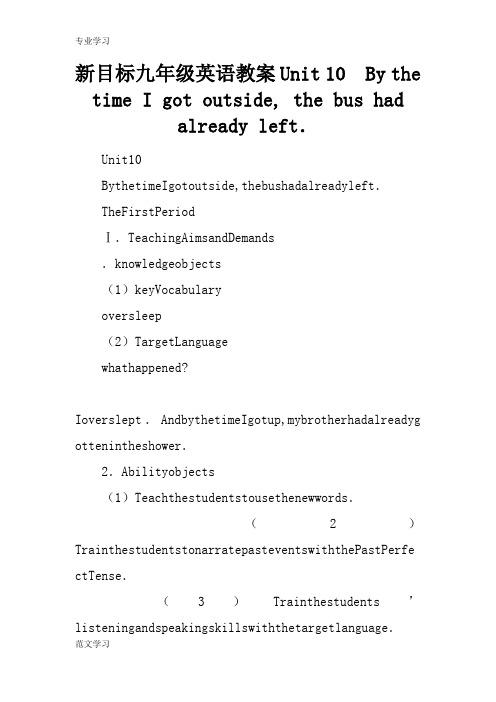
新目标九年级英语教案Unit 10 By the time I got outside, the bus hadalready left.Unit10BythetimeIgotoutside,thebushadalreadyleft.TheFirstPeriodⅠ.TeachingAimsandDemands.knowledgeobjects(1)keyVocabularyoversleep(2)TargetLanguagewhathappened?Ioverslept.AndbythetimeIgotup,mybrotherhadalreadyg ottenintheshower.2.Abilityobjects(1)Teachthestudentstousethenewwords.(2)TrainthestudentstonarratepasteventswiththePastPerfe ctTense.(3)Trainthestudents’listeningandspeakingskillswiththetargetlanguage.3.moralobjectIt’sagoodhabittogotobedearlyintheeveningandgetupearlyi nthemorning.Soyou’llneverbeinahurryinthemorning.Ⅱ.TeachingkeyPoints.keyVocabularyoversleep2.TargetLanguageNarratepasteventswiththePastPerfectTenseⅢ.TeachingDifficultPoints.TrainthestudentstonarratepasteventswiththePas tPerfectTense.2.Trainthestudentstounderstandthetargetlanguageins pokenconversation.Ⅳ.Teachingmethods.Thinkingofexamplesfromthestudents’reallives.2.makingsentencesbylookingatthepictures.Ⅴ.TeachingProceduresStepIRevision.Asksomequestionslikethis:whatvolunteerworkwouldyoul iketodo?Helpthestudentstoanswer,I’dliketo…/Iloveto…/Ihopeto…2.PracticethedialogueinActivity3conpage62again.3.checkthestudents’homeworkbyaskingsomestudentstoreadtheirsentenceswit hthephrasalverbs.Thenaskthestudentstohandintheirho mework.StepⅡ1aFirstwritebythetimeontheblackboard.andtelltheclass themeaningofit.Saythissentencetotheclass:Bythetimetheteachercamein ,thestudentshadbegunreadingEnglish.Tellthemtonotethestructure"hadbegun"inthissentence .Begunisthepastparticipleofbegin.Explainwhatisthe pastparticipleformofaverbforthestudents.Tellthemit isasthesameasthepastformforaregularverb.Andtheyhav etoremembertheirregularverbs’participlesonebyone.writeBythetimeIcameback…ontheblackboard.Saytotheclass,BythetimeIcamein.whathadhappened?Helponestudenttoanswerlikethis,Bythetimetheteacherc amein,Donhadwrittenhisnameontheblackboard.Thengetmorestudentstoanswerdifferently,Readtheinstructionstothestudentsandreadthesequestio nstotheclassaswell.whatdoyouusuallydoin,themorningbeforeschool?Doyouli kemorning?whyorwhynot?chooseonegoodstudenttoanswerthembysayingsomethinghe orsheusuallydoesinthemorning.Thenhavethewholeclasspracticeinpairs.Askeachothert hequestions.Aftertheyfinishtalking,askoneortwopairstosaytheirco nversationstotheclass.correctthemistakestheymaymakewiththeotherstudents.callthestudents’attentiontothepicturesinActivityla.Thentellstudentstotalkaboutthepicturesingroupsoffou r.movearoundtheclassroom,listeningtostudentsandoff eringhelp.makesurethattheytalkinEnglish.Aftertheyallfinishtalking,askdifferentgroupstotellt heclassaboutthepictures.StepⅢ1bAskthestudentstoreadtheinstructionstogether.Haveth emlookatthetwocolumns,AandB,inthechart.Pointoutthe sampleanswer.Readthetwopartsofthesentence.Thengoovertheotherunconnectedpartsofsentences,too.Playtherecordingforthefirsttime.Studentsonlylisten.Thenplayitasecondtime.Letstude ntsmatchtwopartsofeachsentence.checktheanswersbyas kingsomestudentstotelltheiranswers.makesurethatallofthemhavegotthecorrectanswersbylist ening.Saycongratulationstothestudentswhogettheansw erscorrectlybyguessing.StepⅣ1cFirstplaytherecordinginActivity1bagainandletthestud entsreadafterit.Doitatleasttwice.Thenreadtheinstructionstogetherwiththewholeclass.youwillmakeconversationsinpairs.Eachofyouwillhavet otaketurnsbeingTina.LookatthepicturesinActivitylat ohelpyou.Tellyourpartnerwhathappenedtoyouthismorni ng.Askapairtoreadtheexampletotheclassbeforetheybeg irtHavethestudentsworkinpairs.movearoundtheroomofferi nglanguagesupportasneeded.Aftertheyallfinishtalking,asksomepairstosaytheircon versationstotheclass.StepⅤSummaryStepⅥHomework.writeoutthestoryofTina,Notetousethetargetlang uage.2.RevisewhentousethePastPerfectTenseandtheverbstru ctureofit.TheSecondPeriodⅠ.TeachingAimsandDemands.knowledgeobjects(1)TargetLanguageBythetimeshegottoclass,theteacherhadalreadystartedt eaching.whenshegottoschool,sherealizedshehadleftherbackpack athome.whenIgothome,IrealizedIhadleftmykeysinthebackpack.(2)TheThreeFormsoftheverbs.2.Abilityobjects(1)Trainthestudents’listeningskill.(2)Trainthestudents’writingskillwiththetargetlanguage.(3)Trainthestudents’speakingskill.(4)Trainthestudentstousethethreeformsoftheverbs.Ⅱ.TeachingkeyPoints.Listeningpracticewiththetargetlanguage.2.Usethecorrectverbformstofillintheblanksbylisteni ng.3.makesentencesusingthePastPerfectTense.4.Thethreeformsoftheverbs.Ⅲ.TeachingDifficultPoints.writeanendingforthestoryinActivity2c.2.ThethreeverbformsinGrammarFocus.Ⅳ.TeachingProceduresStepIRevision.RevisewhathappenedtoTinainthemorningbyaskingo neortwostudentstotellthestroyonpage68.2.Askstudentstocheckeachother’shomeworkinpairs,pointingoutallthemistakestheymight havemade.3.RevisethePastPerfectTensebyaskingthechildrenwhen touseitandwhatitsverbstructureis.StepⅡ2aReadtheinstructionstotheclass.Besurethatallofthemk nowwhattodo.callthestudents’attentiontothefourpictures.Getthemtoguessthecorrec torderofthepicturesfirst.Thefirstoneisgivenasasamp le.Askoneortwochildrentotelltheirstoriesbydescribi ngthepicturesaccordingtotheirownorder.Playtherecordingthefirsttime,studentsonlylisten.Pl aytherecordingagainandaskthechildrentonumbereachpic ture.checktheanswerswiththeclassandseewhohaveevergotthec orrectanswerswithoutlistening.StepⅢ2bAskthestudentstoreadtheinstructionstogether.Pointo uttheblanksinthesentencesandtheverbsinthebrackets.Letthestudentsfillintheblankswiththecorrectformsind ividually.movearoundtheclassroomcollectingthecommonmistakesth eymaymake.Aftertheyallfinishwriting,tellthemtogetreadytoliste ntotheconversationandchecktheiranswers.Playtherecording.Studentslistenandchecktheiranswer s.correcttheanswersbyaskingsevendifferentstudentst osaytheirstotheclass.StepⅣ2cAskthewholeclasstoreadtheinstructionstogether.wehaveanewtasknow.weknowTinawaslateforclass.whatd oyouthinkhappenedafterTinawaslateforclass?workwitha partner.makeupanendingforthestorybycontinuingit.T hebeginninghasbeengiven.Getstudentstodiscussinpairs.completetheending.makesuretheyaretalkinginEnglish.movearoundtheclassroo m,offeringlanguagesupportifneeded.Aftertenminutes, askstudentstostopdiscussing.Getsomepairsofstudents totelltheclasshowtheythinkthestoryendedAndletthewho leclassdecidewhoseendingisthebest.Telleachpairtowr itedowntheirending,ordoitafterclassiftimeisnotenoug h.StepⅤGrammarFocuscallstudents’attentiontothesentencesontheleft.Askfourdifferents tudentstoreadthefoursentencesandpointoutwherehadplu sapastparticipleisused.writethesentencesontheblack board.Askthestudentstomakesentencescorrectlyusingeachform oftheverbsinthebox.checktheanswers.StepⅥHomework.writedowntheendingofTina’sstory.2.makesentencesusingeachformoftheverbsbelow:leave,walk,start,oversleep,ring,be3.ReviewtheGrammarFocus.TheThirdPeriodⅠ.TeachingAimsandDemands.knowledgeobjects(1)keyVocabularybell,ring,gooff,rush,runoff,ontime,givesb.aride,lo ck,breakdown(2)TargetLanguageBythetimeIgotthere,thebushadalreadyleft.BythetimeIwokeup,myfatherhadalreadygoneintothebathr oom.2.AbilityobjectsTrainthestudents’readingskillwithtargetlanguage.Trainthestudents’speakingskillwithtargetlanguage.Ⅱ.TeachingkeyPoints.Guidethestudentstoreadthearticleinactivity3a.2.Helpthestudentsdotheoralpracticewiththetargetlan guage.Ⅲ.TeachingDifficultPoints.Helpimprovethestudents’readingskillbyActivity3a.2.Helpthestudentsdescribewhathashappenedtothemwith thetargetlanguage.Ⅳ.TeachingProceduresStepⅠRevision.RevisewhathappenedtoTinabyaskingseveralstuden tstotellthestory.2.RevisethethreeformsoftheverbsinGrammarFocusbyask ingfourstudentstowritethemoutontheblackboard.3.checkhomeworkbyaskingoneortwotoreadtheirownendin gsofthestroy.4.checkhomeworkbyaskingsomestudentstoreadthesenten ceswhichtheymade.StepⅡ3aAskthewholeclasstoreadtheinstructionstogether.Ther eisanarticleinActivity3a.yourtaskistoreadthestoryandwritetheeventsinthecorrectorder.Havealookatthesampleanswerontherightofthearticlebef oreyoustart.Thenletthechildrencompletetheworkonthe irown.Afterawhile,asksomestudentstoreporttheiransw erstotheclass.writetheeventsontheblackboardastheyr eport,puttingtheeventsinthecorrectorder.Aftercheckingtheanswers,tellstudentstoreadthearticl eagainmorecarefully.Tellthemtofindoutthewordsorsentenceswhichtheycan’tunderstandthistime.Afewminuteslater,letthestudentsaskquestionsonthewor dsandsentenceswhichtheycan’tunderstand.Dosomeexplanationandmakesurethatthestu dentsmakeeverythingclearaboutthearticle.Thenaskthestudentstoreadthearticlealoud.movearound theclassroomwhiletheyarereading,offeringhelpasneede d.NextaskstudentstopickoutthesentenceswiththePastPerf ectTense.Tellthemtounderlinethemandcomeupwiththere asontousethetence.Asktwostudentstoreadtheiranswersandexplainthesenten ces.StepⅢ3bcallthestudents’attentiontothephotoofthewomansleeping.Thegirlissle eping.Shemayoversleep.Howaboutyou?Haveyoueveroverslept?Getastudentstoanswerthequestionsimply,suchasyes,Iha ve./No,Ihaven’t.Thenaskonestudenttoreadtheinstructionstotheclass.Explainthatdescribethecircumstancesmeanstotellwhen, whereandhowthethingshappened.Askonestudentwhohaseveroverslepttoanswerthefirstquestionanddescribethecircumstance.Helphimorherusethe PastPerfectTensetodescribethecircumstance.Thenaskstudentstoreadthequestionsandwritetheiranswe rsintheirexercisebooks.Tellthemthattheyhavetodescr ibethecircumstancesiftheiranswersareyes,andtheresho uldbeatleastonesentencewiththePastPerfectTenseineac hdescription.movearoundtheclassroomprovidingsenten cestotheoneswhoneed.Askseveralstudentstosharetheir storieswiththeclass.correctanymistakestheymaymake .Letthemchecktheanswersinpairs.StepⅣ3cAskthewholeclasstoreadtheinstructionstogether.Then callthestudents’attentiontothesampleconversationontheright.Askapai rofthestudentstoreadtheconversationtotheclass.Plea seaskyourpartnerthequestionsinActivity3b.Askmorequ estionsifheorshesays"yes".Askthestudentstoworkinpairs.Encouragethemtoaskasma nyquestionsastheycan.Astheywork,movearoundtheroomofferinghelpandansweringquestionsasneeded.Asksomepa irstosaytheirconversationstotheclass.StepⅥhomework.writetheanswerstothequestionsinActivity3b.2.writeaconversationinActivity3c.TheFourthPeriodI.TeachingAimsandDemands.knowledgeobjects(1)keyVocabularycostume,showup,exhausted,embarrassed,empty,fool,Apr ilFool’sDay,gooff,stayup(2)TargetLanguagewhenIgotthere,Ifoundthathehadfooledme.Afteranhour,theotherkidsshowldup,andIrealizedthatmy brotherhadfooledme.BythetimeIgottomatchclass,IwasexhaustedbecauseIhads tayedupallnightstudying.Ifoundoutthatmyfriendhadfooledme.2.Abilityobjects(1)Trainthestudents’writing,listeningandspeakingskillswiththetargetlang uage.(2)Trainthestudentstousethenewvocabulary.Ⅱ.TeachingkeyPoints.Trainthestudents’listeningandspeakingskillswithtargetlanguage.2.Teachthestudentsthenewvocabulary.Ⅲ.TeachingDifficultPoints.Guidelisteningandoralpracticeusingthetargetla nguage.2.Helplearntousethenewvocabularycorrectly.Ⅳ.TeachingProceduresStepIRevision.RevisethearticleinActivity3aonpage70byaskings everalstudentstoreadit.2.Dictatesomewordsandphrases:3.checkthehomework.StepⅡ1aReadtheinstructionstothestudents.Remembertoreadthe sentenceinthebrackets.PointtothechartwiththethreeheadingsNouns,VerbsandAdjectives.Readthewordsintheb racketstothestudentsandhelpthestudentstounderstandt hemeaningsofnouns,verbsandadjectives.Getastudenttoreadthesampleanswerstotheclassbeforeth eystartsay,Foolcallalsobeaverb.Askthestudentstocom pletethechartontheirown.correcttheanswersbyaskingthreestudentstoreadtheiran swerstotheclass.StepⅢ1bAskastudenttoreadtheinstructionstotheclass.Askanotherstudenttoreadtheexampleontheright.workinpairsnow.Tellyourpartneraboutsomethingthatha shappenedtoyourecently.Notetousetwoormorephrasesfr omthelistinActivityla.Gettilestudentstotalkinpairs .movearoundtheclassroomcheckingtheirworkandofferin glanguagesupportasneeded.Aftertheyallfinishtalking,asksomepairstosaytheircon versationstotheclass.StepⅣ2aSaysomethingaboutAprilFool’sDaytothestudentscallthestudents’attentiontothefourpictures.Askthestudentswhatishap peningineachpicture.Askfourdifferentstudentstodescribethepictures.Readtheinstructionstotheclass.Playthetapethefirsttime.Thestudentsonlylisten.The nplaythetapeagain.Askthestudentstowriteeachboy’snameinthecorrectbox.checktheanswersbyaskingdiffer entstudentstotelltheirownanswers.StepⅤ2bReadtheinstructionstotheclass.Therearesixphrasesin thebox.yourtaskistofindoutwhosayseachofthephrases, Dave,Nickorjoeafterlisteningtothesamerecording.And write"D"forDave,"N"forNickand"j"forjoesontheshortli nesbeforethephrases.Lookatthefirstone.Theanswerha sbeengivenasasample.Playtherecordingthefirsttime.Thestudentsonlylisten.Thenplaytherecordingagain.Askthestudentstowritet helettersintheblanks.Asksixdifferentstudentstorepo rttheiranswerstotheclass.checktheanswerswiththecla ss.StepⅥ2cThisactivityprovidesoralpracticeusingthetargetlangu age.Firstplaytherecordingagain.Pauseaftereachsentencea ndgetthestudentstorepeat.Doitatleasttwice.Askastudenttoreadtheinstructionstotheclass.Thenhav ethemlookatthesampleconversationontheright.Askapai rofthestudentstoreadandtrytocontinueitThenaskthestudentstoworkinpairs.Eachpairmakestwoconversationsusinginformationfromth eearlieractivities.movearoundtheroomastheywork,offeringhelpasneeded.Askoneortwopairstosaytheirconversationstotheclass.StepⅦHomework.writesomethingthathashappenedtoyourecently.U setwoormorephrasesfromthelistinActivity1a.2.writeaconversationinActivity2c.TheFifthPeriodⅠ.TeachingAimsandDemands.knowledgeobjects(1)keyVocabularyannounce,describe,convince,panic,setoff,authority,r eveal,hoax,flee/fled/fled,spaghetti,girl-friend,Sho w,marry,thrill,getmarried,reply,ending(2)ThereadingpassagesaboutAprilFool’sDay.(3)writestorieshappenedonAprilFool’sDay.2.Abilityobjects(1)Trainthestudents’readingskill.(2)Trainthestudents’writingandspeakingskills.Ⅱ.TeachingkeyPoints.Teachthestudentsthenewvocabulary.2.Helpthestudentsunderstandthethreearticles.3.GuidethestudentstowritestorieshappenedonAprilFool’sDay.Ⅲ.TeachingDifficultPoints.Helpthestudentsunderstandthethreearticles.2.HelpthestudentswritethestorieshappenedonAprilFool’sDay.Ⅳ.TeachingProceduresStepIRevision.Revisethethreeboy’sstorieshappenedonAprilFool’sDay.Askthreedifferentstudentstotelltheirstoriesto theclass.2.checkthehomework.StepⅡ3aReadtheinstructionstothestudents.you’llhavetoreadthreearticles.Thethreearticlesareabout threedifferentstorieshappenedonAprilFool’sDay.Notallofthemaretrue.Tellwhichofthesestoriesisthemo stbelievableandwhichistheleastbelievable.Andyouhav etotellthereasonsaswell.Atlast,thinkoverifyouwouldbefooledbyanyofthestories.Readthefirstarticletotheclass.Thestudentslookatthe irbooks,listentotheteacherandfindouttheanswerstothe questionsintheinstructions.Afterreading,askthestudentsifitisbelievableandwhy.Askseveralstudentstotelltheiropinionsonthebelievabi litythefirstarticle.Theymaysaylikethis:Ithinkitisbelievablebecausetheexacttimeandperson’snamearegiveninthefirstsentence,or,Idon’tthinkit’sbelievablebecauseIthinknoonedaredtofoolthepeopleli kethat.Dothesamewiththetwoarticlesleft.Asktwogoodstudentstoreadthearticlesinsteadoftheteac her.Elicitstudents’reasonsfortheiranswers.Atlasttellthestudentsthecor rectanswer.StepⅢ3bReadtheinstructionstotheclass.Playtherecordingagai ntohelpthestudents.Askthreedifferentstudentstoreadthenotestotheclass.Helpthestudentsmakesentenceswiththenotesfirst.Aftermakingsentences,askthestudentstowriteamagazine storyaboutNickinActivities2aand2b,usingthenotesbelo w.Astheywrite,movearoundtheroomofferinghelpandansw eringquestionsasneeded.Afteraroundtenminutes,askastudenttoreadthecompleted articletotheclass.Therestoftheclasshelpcorrectthemistakesthestudentma yhavemade.Getthemtocheckeach’other’swritingcarefullyinpairs.StepⅣ3cReadtheinstructionstotheclass.Besurethatthestudent sknowwhattheyareaskedtodo.Atfirst,havethestudentst hinkwhattheymightwriteabout.Thentellthemtomakealistofideasbeforestartingwriting .Thelistshouldincludethethreeparts,whathappenedfir st,whathappenednext,andwhatyoufinallyrealized.writeasamplelistontheblackboard:Nextaskthestudentstowritetheirjokes.Asksomestudentstoreadtheirarticlestotheclass.corre ctasmanyofthearticlesaspossibleinclass.StepⅤ4Readtheinstructionstotheclass.Reviewthemeaningsoff unniest,mostembarrassingandmostcreative.Havetheclasshavealookatthesampleconversationinthebo xbeforereading.Askapairofthestudentstoreadittotheclass.Thenaskthestudentstoreadtheirstoriestotheclass.Aft erallofthestudentshaveread,asktheclasstovoteforthef unniest,mostembarrassingandmostcreativestories.StepⅥHomework.Readthethreearticlesaloudafterclass.2.correctthemagazinestoryandthejokeyouhavewritten.3.Trytorememberthenewvocabulary.TheSixthPeriodⅠ.TeachingAimsandDemands.knowledgeobjects(1)Verbsrush,realize,invite,showup,stayup.(2)writeanarticleaccordingtothepicturesgiven.(3)Vocabularyhomework,look,costume,empty2.Abilityobjects(1)Trainthestudentstousetheseverbscorrectly:rush,realize,invite,showup,stayup.(2)Trainthestudents’writingskill.Ⅱ.TeachingkeyPoints.Helpthestudentshaveaselfcheckonthekeywordsand targetlanguageofthisunit.2.Practiseusingtheseverbs:rush,realize,invite,show up,stayup.3.Reviewthenewvocabularyintroducedinthisunit:homew ork,lock,costume,empty.4.Directthestudentstowriteanarticleaccordingtothep icturesgiven.Ⅲ.TeachingDifficultPoints.Helpthestudentsmakesentenceswiththeverbs.2.Directthestudentstowriteanarticlewiththepictures given.Ⅳ.TeachingProceduresStepIRevision.RevisethecontentsinthethreearticlesinActivity 3aonpage72byaskingsomequestions2.Askthreedifferentstudentstoreadthearticles.StepⅡPart1Thisactivityfocusesonvocabularyintroducedintheunit .Focusattentiononthebox.Inviteastudenttoreadthevo cabularywordsatthetop.Askstudentstofillintheblanksontheirown.checktheans wers.Askstudentstomaketheirownsentenceswiththewords,pref erablysentencesthataremeaningful.movearoundtheroom .collectafewstudents’answerswithmistakesontheblackboard.Alongwiththestu dents’helpcorrectthemistakes.StepⅢPart2Havethestudentslookatthesevenpictures.Tellthechild renthatthepicturesareconnectedtoeachotherinanorder.Ask:whatishappeningtoming?Getthewholeclasstoreadtheinstructions.Thenaskthest udentstodescribeeachpictureinorder.writesomeuseful sentencesontheblackboard.Forexample,forthefirstpic ture,helpthestudentstosaymingwakesupat10:00andthink ssheislateforschool.Afterawhile,askafewstudentstotelltheclassaboutming’sday.Lettherestoftheclasshelpcorrectthemistakesthattheymayhavemade.Tellthemtoexchangetheirarticleswiththeirpartnersand helpeachothercorrectthemistakes.Askthestudentstore writetheirarticlestomakethearticlesperfectafterclas s.StepⅣPart3callthestudents’attentiontothebox.Havethemlookatthefourgroupsofwor ds.Getthestudentstoreadtheinstructionstogether.As kthemtocirclethewordsthatdon’tbelongineachgroup.Thefirstonehasbeengivenasamodel.Asksomestudentstotelltheiranswerstotheclass.checkt heanswerswiththewholeclass.StepⅤjustforFun!callthestudents’attentiontothecartoonpictures.Tellthemtoseewhathap pens.Askthestudentstoreadthesentencesunderthepicturestog ether.专业学习Thenaskthechildrenwhatis,funnyaboutthiscartoon.Hel pthestudentstoanswerlikethis:Theboysawthecloudsandhefelttherainlongbeforehegotho me.Heshouldhaverealizedmuchsoonerthathehadforgotte nhisumbrella.StepⅥHomework.Reviseallthelanguagepointsinthisunit.2.Finishofftheexercisesonpages36~38oftheworkbook.3.makeanothermoresentencewitheachverbbelow,rush,re alize,invite,showup,stayup.4.Rewritethearticle.范文学习。
陕西省西安市庆安中学九年级英语全册 Unit 10 By the time I got outsid
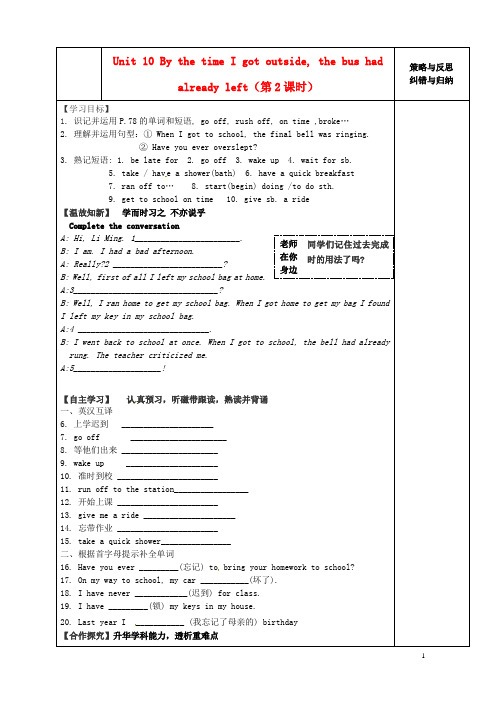
Unit 10 By the time I got outside, the bus hadalready left (第2课时)策略与反思 纠错与归纳【学习目标】1. 识记并运用P.78的单词和短语, go off, rush off, on time ,broke …2. 理解并运用句型:① When I got to school, the final bell was ringing.② Have you ever overslept?3. 熟记短语: 1. be late for 2. go off 3. wake up4. wait for sb.5. take / hav e a shower(bath)6. have a quick breakfast7. ran off to …8. start(begin) doing /to do sth.9. get to school on time 10. give sb. a ride 【温故知新】 学而时习之 不亦说乎 Complete the conversationA: Hi, Li Ming. 1________________________.B: I am. I had a bad afternoon.A: Really?2 _________________________?B: Well, first of all I left my school bag at home.A:3_________________________________?B: Well, I ran home to get my school bag. When I got home to get my bag I found I left my key in my school bag.A:4 ______________________________.B: I went back to school at once. When I got to school, the bell had already rung. The teacher criticized me.A:5____________________!【自主学习】 认真预习,听磁带跟读,熟读并背诵一、英汉互译6. 上学迟到 _____________________7. go off ______________________8. 等他们出来 ______________________9. wake up _____________________10. 准时到校 _______________________11. run off to the station_________________12. 开始上课 _______________________13. give me a ride _____________________14. 忘带作业 _______________________15. take a quick shower________________二、根据首字母提示补全单词16. Have you ever _________(忘记) to bring your homework to school?17. On my way to school, my car ___________(坏了).18. I have never ____________(迟到) for class.19. I have _________(锁) my keys in my house.20. Last year I ___________ (我忘记了母亲的) birthday 【合作探究】升华学科能力,透析重难点 老师在你身边 同学们记住过去完成时的用法了吗?.1. go off 发出响声There’s something wrong with my alarm clock and it doesn’t go off.go off (水电)断掉;失灵;变质The lights went off. 译:_______________________________________go by(时间)过去;消逝Time goes by second by second. 译:______________ go on 继续Please go on reading. 译:____________________________go away 离开;消失;走开They packed their clothes and went away. 译: __________________________ 2. run off跑掉;迅速离开。
九年级英语_Unit_10_By_the_time_got_outside__the_bus_had_already_left导学练_人教新目标版
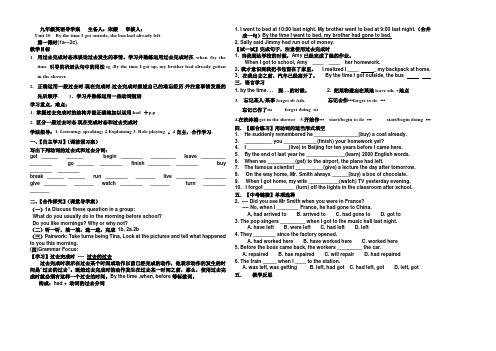
九年级英语导学案主备人:宋媛审核人:Unit 10 By the time I got outside, the bus had already left第一课时(1a—2c).教学目标1.用过去完成时态来谈论过去发生的事情。
学习并熟练运用过去完成时在when /by thetime 引导的状语从句中的用法eg .By the time I got up, my brother had already gotten in the shower.2.正确运用一般过去时,现在完成时,过去完成时叙述自己的难忘经历,并注意事情发展的先后顺序. 3.学习并熟练运用一些动词短语学习重点,难点:1. 掌握过去完成时的结构并能正确地加以运用.had +p.p2. 区分一般过去时态,现在完成时态和过去完成时学法指导:1. Listening; speaking;.2.Explaining 3. Role playing 。
4自主,合作学习.一、【自主学习】(课前预习案)写出下列动词的过去式和过去分词:get ______ ______ begin ________ _________ leave _________ ________ go ______ ________ finish ________ ________ buy ________ ________break ______ ______ run ________ _______ live _______ ________ give ________ _______ watch ________ _______ turn ________ _______二、【合作探究】(课堂导学案)(一)1a Discuss these question in a group:What do you usually do in the morning before school?Do you like mornings? Why or why not?(二)听一听,填一填,选一选,完成1b, 2a.2b(三)Pairwork: Take turns being Tina, Look at the pictures and tell what happened to you this morning.(四)Grammar Focus:【学习】过去完成时---- 过去的过去过去完成时表示在过去某个时间或动作以前已经完成的动作,他表示动作的发生的时间是―过去的过去‖。
Unit10--By-the-time-I-got-outside.九年级第十单元

Unit10--By-the-time-I-got-outside.九年级第十单元Unit10 By the time I got outside,the bus had already leftI.高频词组1.by the time 到........时候2.go off 发出响声,闹响3.run off/away 跑掉,离开4.on time 准时5.break down /out 损坏;;爆发6.show up 出席,路面7.set off 启程,引起8.get married 结婚9.rush at/out of 朝某人冲;冲出.......地方10. feel /get exhausted 筋疲力竭11.convince sb of sth 是某人相信某事12.in one’s forties 在某人四十几岁13.sell out 卖光14.get dressed 穿衣服15.no wonder 难怪16.happen to sb 发生在某人身上II.重点词法知识1.到…时候by the time +…(句子)…从过去某一点到从句所示时间为止的一段时间,即从句用过去时,主句用过去完成时。
2.(闹钟)闹响go off3.跑掉;迅速离开run off4.损坏break down (突然)中断break off5.(在)愚人节(on) April Fool's Day6.激起;引起set off7.一片,一块a piece of8.按时on time 及时in timeSection A1.从…离开去…leave (from)…for …把某物遗忘在某地leave sth. +介宾短语(表地点的)忘记某人/某事forget sb /sth.忘记去作…forget to do …忘记已作了…forget doing …2.在洗沐浴get in the shower3.开始作…start/begin to do …(前后不同的事)start/begin doing …(前后相同的事)4.我上学从未迟到,但昨天我差点迟到.I 've never been late for school ,but yesterday I came very close.5.等待(某人)作…wait (for sb )to do …6.出来;开花come out 实现come ture 从旁而过come by 来自…come/be from…7.我必须抓紧了.I had to really rush.8.飞快冲了个澡take/have a quick shower9.给/让某人搭便车give/get sb. a ride =give /get a ride to sb.10.我恰好赶上上课.I only just made it to my class.(此时,指"约定"之意)Section B1.给某人穿衣服dress sb.穿(…)衣服be /get dressed (in +衣服)化装;打扮dress up2.熬夜stay /sit up (late)3.给某人看某物show sb .sth.=show sth .to sb.带某人参观…show sb.around sth.卖弄…show off…出席,露面show up展览be on show =be on display4.化妆舞会a costume party5.在地球着陆land on the earth6.由演员奥森·威尔斯主持的广播节目a radio program by actor Orsom Welles7.遍及全国across the whole country =all over the whole country8.从…逃跑;避开…flee from…=run away from…(flee过去式为fled )9.将有…the re will be ….(一般将来时)there would be …(过去将来时)10.买尽可能多的意大利面条buy as much spaghetti as they could /possible11.让某人嫁过某人ask sb .to marry sb.结婚get married和…结婚get /be married with …=marry …12.停止作…stop doing … 停下某事来作…stop to do …13.在开学第一天on the first day of school14.(向某人)打招呼say hello (to sb.)15.醒来wake up 叫…醒来wake sb. up16. 有一个很愉快的结局have a very happy ending17.失去了他的女朋友和他的观众lose both his girlfriend and his showIII .重要句型1.By the time I hot out,the bus had already left.2.When I got to school, I realized that I had left my backpack left.3.Wells was so convincing that hundreds of people believed the story ,and panic set of across the whole country.IV..语法. 过去完成时(1) 构成:由助动词had + 过去分词构成否定式:had not + 过去分词缩写形式:hadn’t(2) 用法:过去完成时表示在过去某一时间或动作之前已经发生或完成了的动作。
初中九年级英语:Unit10BythetimeIgotoutside教学设计小学教育

初中九年级英语:Unit 10 By the time I got outside教学设计- 小学教育新修订学校阶段原创精品配套教材Unit 10 By the time I got outside教学设计教材定制/ 提高课堂效率/内容可修改This teaching plan is customized for the original teaching materials and is suitable for classroom teaching. The content can be modified according to the actual needs老师:风老师风顺其次中学编订:FoonShion教育Unit 10 By the time I got outside教学设计unit 10by the time i got outside, the bus had already left.一、学习目标(language goal)1.learn to narrate past events.学会描述过去所发生的事情。
2.learn to express something with past perfect tense. 学习使用过去完成时态。
3.strengthen the consciousness of doing things regularly.做事加强连续性,有条不紊。
二、重点词组(key phrases)1.by the time 到…时候为止2.get outside 到外边3.get to school 到学校4.get up 起床5.get into the shower 去洗澡6.get home 到家第2页/ 总21页7.start doing / to do sth. 开头做某事8.be late for 迟到9.go off (闹钟)闹响10.wake up 醒来11.come out 出来,消失12.run off 快速离开,跑掉13.on time 准时14.in time 准时15.come by (走)过来16.give sb. a ride 让某人搭车17.break down 损坏,坏掉18.show up 出席,露面19.stay up 熬夜20.a costume party 一个扮装舞会21.sth. happen to sb. 某事发生在某人身上22.so …that … 如此…以至于23.set off 动身,开头24.april fool's day 愚人节25.get married 结婚26.marry sb. 与某人结婚27.both …and … 二者…都…28.get dressed 穿好衣服第3页/ 总21页29.on the first day 在第一天三、[交际用语]1.by the time she got up, her brother had already gone into the bathroom.2.by the time she went outside, the bus had already gone 3.by the time she got to class, the teacher had already started teaching.4.when she got to school, she realized she had left her backpack at home5.have you ever overslept?6.have you ever been late for school?四、[重点难点释义](language points)1.get to 意为“到达”。
湖南省桑植县十一学校九年级英语全册《Unit 10 By the time I got outs

九年级英语全册《Unit 10 By the time I got outside, the bus had already left》(第2课时)Section A(3a-4)学案(无答案)【学习目标】1.语言目标1)词汇:【定向自学】预习提示:1.My alarm clock didn't go off, … 闹钟没有大响……go off 意为“爆发,大响”。
例如:与go有关的词组还有:(1)go in for“参加”(竞赛、考试);(作为嗜好、工作)“爱好”。
例如:She goes in for bird-watching.她爱好赏鸟。
(2)go on doing sth或go on with sth“继续做……”。
例如:(3)go over“调查,视察;越过”。
例如:You must go over your lessons before the exam.2.I started walking, but I knew I couldn’t get to school on time.我开始步行,但我知道我已经不能按时到达学校了。
start to do sth和start doing sth都表示“开始做某事”,常可相互替换3. give sb a ride意为“让人搭便车”,其中ride是名词4. I only just made it to my class.made it 意为“成功了,做成了”Task I:I can read:我能读能力目标中的单词。
Task II:I can write:Task III:I can say: 我能用含有过去完成时的句子来谈论过去的过去所发生了的事情。
【合作探究】Group work:Task I :用3b的问题来做个调查吧.A:Have you ever overslept?Have you been late for school?B:Yes, I have.A: Why were you late?B: My clock didn’t go off.A: What did your teacher do?B …Task II:根据调查情况做个汇报吧:In my group, Lily has ever overslept.She was late because…Mary has forgotten to bring her homework to school…_______________________________________________________________________________ _________________【归纳总结】本单元的重点过去完成时。
- 1、下载文档前请自行甄别文档内容的完整性,平台不提供额外的编辑、内容补充、找答案等附加服务。
- 2、"仅部分预览"的文档,不可在线预览部分如存在完整性等问题,可反馈申请退款(可完整预览的文档不适用该条件!)。
- 3、如文档侵犯您的权益,请联系客服反馈,我们会尽快为您处理(人工客服工作时间:9:00-18:30)。
• 关于get的词组小结 • get to school 到学校 • get into the shower 去洗澡 • get outside 到外边 • get home 到家 • get up 起床 • get married 结婚 • get dressed 穿好衣服 • get to class 到班级 • get bored 变得无聊 • get tired 变得疲劳
had broken 4. One of the men couldn’t move, because he __________ (break) his legs.
I’ve never been late for school, but yesterday I 3a came very close. My alarm clock didn’t go off, and by the time I woke up, my father had already gone into the bathroom and I had to wait for him to come out. I had to really rush. I took a quick shower, had some breakfast, and then ran off to the bus stop. Unfortunately, by the time I got there, the bus had already left. I started walking, but I knew I couldn’t get to school on time. Luckily, my friend Tony and his dad came by in his dad’s car and they gave me a ride. When I got to school, the final bell was ringing. I only just made it to my class.
have breakfast
Tina _____ up late. got
had By the time she got up, her brother _______ already _________ in the shower. gotten
By the time she got outside, the bus had left ______ already _______.
go into 进入 bathroom 卫生间 wait for 等待、等候 come out 出来、花开 rush 冲、跑 take a shower 沐浴、洗澡 run off 跑步离开 unfortunately 不幸的是 get to school 到学校 on time 按时、准时 came by 路过 make it 成功 give sb. a ride 捎某人一程
What do you usually do in the morning before school?
brush my teeth
What do you usually do in the morning before school? take a shower
What do you usually do in the morning before school ?
took a shower quickly
等他
Unfortunately, by the time I got there, the bus had Unluckily already left. I started walking, but I knew I couldn’t I could be late for school get to school on time. Luckily, my friend Tony and 按时 Fortunately his dad came by in his dad’s car and they gave
她出去的时候,公共汽车已经开走了.
by the time 意思是 “到…的时候”, 相当于 when , 后接过去时的句子 时, 主句的谓语动词用过去完成时态.
过去完成时态的用法:
1、表示过去的过去,通常由by引导的短语做时间 状语或者由by / when / before引导的从句做时间 状语从句 ① By the end of last year, I had learned about one thousand English words. ② By the time he was twenty, he had won about ten medals. ③ When I got there, they had already left.
I’ve never been late for school, but yesterday I came very close. My alarm clock didn’t go off, and by the time I woke 醒来 ring up, my father had already gone into the
/klous/
现在完成时态
bathroom and I had to wait for him to
come out. I had to really rush. I took a 出来 run very quickly quick shower, had some breakfast, and then ran off to the bus stop.
Unit10 By the time I got outside, the bus had already left.
6:00
7:00
现在
By the time I got up, my sister had already washed all the clothes.
The teacher came into the classroom
④ They had already had breakfast beaid that he had never seen such a beautiful bird before.
2、常用在宾语从句中
① He told me he had already finished his homework.
8:00 am
8:15
now
I got to school
By the time I got to school, the teacher had come into the classroom.
By the time she got outside, the bus had already left.
本课出现的主要动词的过去式和过去分词
ring get go leave start be take run wake
rang got went left started was/were took ran woke
rung gotten gone left started been taken run woken
got By the time I ____(get) back to school, the bell had rung ________(ring).
walked By the time I _______(walk) into class, the had started teacher __________(start) teaching already.
She _____ all the way to school. ran
When I got to school, I realized that I had left my backpack at home.
realized got home When I ________(get home), I _______(realize) I had left _______(leave) my keys in the backpack.
从旁边路过
me a ride. When I got to school, the final bell was
让某人搭便车
ringing. I only just made it to my class.
刚好 办成功,做成
Words and Expressions:
alarm clock 闹钟 go off (铃)响 by the time 到… 时候 wake up 醒来
1.When I was doing my homework, the clock went off _____ ______. 当我正在做作业的时候,钟表响了。 2.We are close (临近) to the station . _____ rushed 3.He ______ into (冲进) the room and ____ caught the thief. ran off 4.I tried to catch the thief but he____ _____ (跑开了) give me a ride 5.Would you please ____ ____ _____ _____ (搭 便车)to the cinema? 6.When I got to school, the final bell was ringing, Ionly just ____ ____(刚好) made it to my class.
had learned 1. We ___________(learn) two thousands words by the end of last year. had known 2. I ___________him when I was a student. arrived
